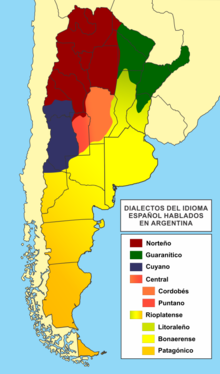
Back لغات الأرجنتين Arabic Llingües d'Arxentina AST আর্জেন্টিনার ভাষা Bengali/Bangla Lingvoj de Argentino Esperanto Lenguas de Argentina Spanish Langues en Argentine French आर्जेंटीना की भाषाएँ Hindi Языки Аргентины Russian Språk i Argentina Swedish
| Languages of Argentina | |
|---|---|
 Sign in San Francisco, Córdoba, in Spanish, Italian and Piedmontese | |
| Official | de facto Spanish |
| Indigenous | Tupi-Guarani languages, Mataco–Guaicuru languages, Mapuche, Chaná, Quechua[1] |
| Vernacular | Rioplatense Spanish, Lunfardo, Portuñol |
| Minority | Italian, English, German, Plautdietsch, Chinese, Welsh |
| Foreign | English |
| Signed | Argentine Sign Language |
| Keyboard layout | |
| Part of a series on the |
| Culture of Argentina |
|---|
 |
| Society |
| Topics |
| Symbols |
|
|

Spanish is the language that is predominantly understood and spoken as a first or second language by nearly all of the population of Argentina. According to the latest estimations, the population is currently greater than 45 million.[2]
English is another important language in Argentina and is obligatory in primary school instruction in various provinces. Argentina is the only Latin American country characterized as "high aptitude" in English, being placed 15th globally in the year 2015, according to a report from the English Aptitude Index.[3][4] In 2017, Argentina fell ten places from its best position and fell to 25th place, though it continues to be the second highest ranked Ibero-American, after Portugal.[5]
Guarani and Quechua are other important languages in Argentina with 200,000 speakers and 65,000 speakers respectively.[6]
Fifteen Indigenous American languages[6] currently exist and five others (today extinct) existed in different regions. The vernacular Indigenous American languages (native to the Argentine territory) are spoken by very few people. In addition there is Lunfardo, a slang or a type of pidgin with original words from many languages, among these languages are ones from the Italian Peninsula, such as Piedmontese, Ligurian, and others like Italian, Portuguese, etc., and have been seen in the Río de la Plata area since at least 1880. There is also Portuñol, a pidgin of Portuguese and Spanish spoken since approximately 1960 in the areas of Argentina that border Brazil.
Another native language is Argentine Sign Language (LSA), which is signed by deaf communities. It emerged in 1885.
After the above-mentioned languages German follows (around 200,000, including a significant number of the Volga German dialect and of the Plautdietsch language). Multitude of Eurasian and immigrant languages are spoken in their respective ethnic communities throughout the country; these are namely Albanian, Arabic, Armenian, Asturian, Basque, Belarusian, Bosnian, Bulgarian, Catalan, Chinese, Croatian, Czech, Danish, Dutch, Estonian, Finnish, French, Galician, Greek, Hebrew, Hungarian, Irish, Japanese, Korean, Latvian, Lithuanian, Macedonian, Norwegian, Occitan, Polish, Portuguese, Romani, Romanian, Russian, Serbian, Slovene, Swedish, Turkish, Ukrainian, Welsh, and Yiddish. Most of these languages have, with the exception of Chinese and Plautdietsch, very few speakers and are usually only spoken in family environments.
- ^ "Argentina – Language". argentina.gov.ar. Retrieved 2011-06-12. August 2013
- ^ "Argentina Population". www.fmlaruta.com. Retrieved 2019-06-02.
- ^ Mundo, Redacción BBC (11 February 2015). "¿En qué países de América Latina hablan el mejor inglés como segundo idioma?". BBC News Mundo (in Spanish). Retrieved 2019-06-02.
- ^ "EF EPI 2018 – Argentina". www.ef.com.ar (in Spanish). Retrieved 2019-06-02.
- ^ Clarín.com (10 November 2017). "Los argentinos dejaron de tener un nivel "alto" de inglés y el país bajó 6 puestos en un ranking". www.clarin.com (in Spanish). Retrieved 2019-06-02.
- ^ a b "🇦🇷 Idioma de Argentina ▷ Lenguas oficiales de los argentinos". 🌍 ¿Qué idioma? (in Spanish). Retrieved 2019-06-02.
